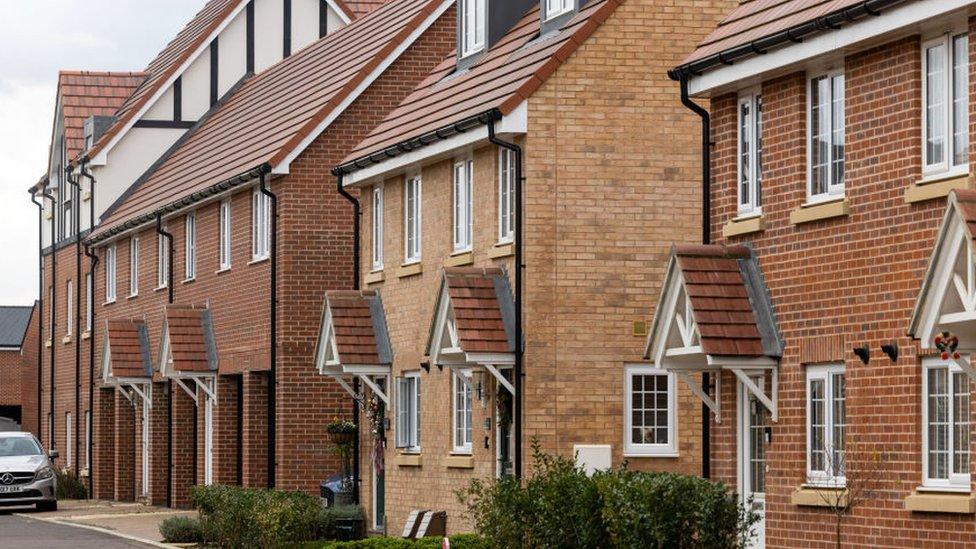Nationwide: House price growth remains subdued in March
- Published
- comments

House price growth was "subdued" last month as higher mortgage rates affected affordability, the Nationwide has said.
Property prices rose 1.6% on average from March 2023, but fell 0.2% compared with the February, the UK's largest building society said.
While mortgage rates have fallen from peaks seen last summer, they remain well above the low levels seen in the wake of the coronavirus pandemic.
The Nationwide said affordability was still stretched, but was improving.
Robert Gardner, the building society's chief economist, told the BBC's Today programme that affordability pressures on buyers was "weighing down" on activity in the housing market and price growth.
For someone on an average wage of about £35,000 per year buying a typical home, mortgage payments currently take up nearly 40% of their take home pay.
"That's well above the 30% which is the long-run average," Mr Gardner said.
In Northern Ireland and the North of England house price growth was stronger than other areas, rising 4.6% and 1.7% respectively compared with last year.
This was mainly due to house prices in those regions being less expensive compared with other places in the UK and more affordable for buyers, leading to higher demand.
The annual house price increase of 1.6% was the fastest rise since December 2022, although it was a smaller increase than economists had been expecting.
Prices fell by 0.2% in March alone, the first drop since December 2023, after a 0.7% increase the month before.
In a statement, Nationwide said mortgage approvals in January were 15% lower than before the Covid pandemic, reflecting the impact of higher interest rates, which are at a 16-year high.
However, Mr Gardner said income rises were outpacing the house price increases, gradually making houses more affordable.
"But it's going to take time to make a big difference," he warned.
Mr Gardner said many people were expecting the Bank of England to lower interest rates this year, which would have a knock-on effect of lower mortgage rates.
The Bank of England decided to keep its main interest rate at 5.25% last month, but announced that rate cutes were "on the way".
Financial markets are predicting a first cut in June or August, with rates forecast to drop to around 4.5% by the end of the year.
The number of mortgage approvals rose in February to the highest level since the month the mini-budget was delivered under former prime minister Liz Truss.
More than 60,380 mortgage approvals were recorded, the highest figure since more than 65,340 deals got the go-ahead in September 2022, according to Bank of England figures.
The launch of the mini-budget on 23 September 2022 led to mortgage rates rocketing after financial markets reacted badly.
In compiling its figures, Nationwide looks at its own mortgage lending and does not include cash buyers or buy-to-let deals. Cash buyers account for about a third of housing sales.
Rob Wood, chief UK economist at Pantheon Macroeconomics, said mortgage rates were likely to "gradually tick down" and that house prices would continue to rise.
Chief executive of Foxtons estate agents, Guy Gittins, added that there had been a "notable uplift in the volume of sales enquiries, viewings requests and the number of offers being submitted" in recent months.
- Published27 March 2024

- Published23 March 2024
